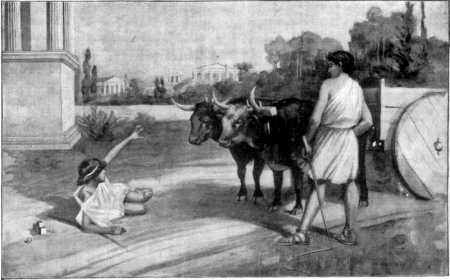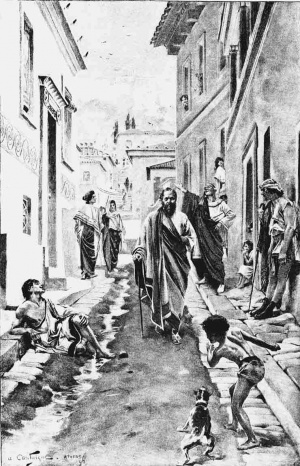Alcibiades: Difference between revisions
No edit summary |
|||
| Line 45: | Line 45: | ||
{{Mediaboywiki|title=''Alcibiades''|Category:Alkibiadēs}} | {{Mediaboywiki|title=''Alcibiades''|Category:Alkibiadēs}} | ||
{{reflist|2}} | {{reflist|2}} | ||
==See also== | |||
*[[Alcibiades the Schoolboy (book)]] | |||
==External links== | ==External links== | ||
Revision as of 18:02, 8 April 2015
Alcibiades, son of Cleinias, from the deme of Scambonidae (/ˌælsɨˈbaɪ.ədiːz/; Greek: Ἀλκιβιάδης Κλεινίου Σκαμβωνίδης, transliterated Alkibiádēs Kleiníou Skambōnidēs; c. 450 – 404 BC) historically was a Greek statesman and general. However, he has been best known posthumously as a disciple and especially the beloved boy (eromenos) of Socrates. This is clearly seen in Plutarch's life of Alcibiades [1], and in Plato's better-known Symposium. He has been, in post-Renaissance times, a coded symbol of pederasty. [2]
Alcibiades was orphaned at a young age leaving him with a large inheritance and he was brought up by Pericles and Ariphron, the sons of Xanthippus, who were his distant cousins. Plutarch says of Antiphon that he "admits that he hated Alcibiades, and abused him accordingly".[3]
Even as a young boy, he was very strong-willed. And perhaps as he had no father and mother to restrain his noble boyish inclinations, he was sometimes led by his own tenacity and courage into great danger. We are told that once, when he saw a wagon coming down the street where he and his playmates were playing knucklebones (jacks), he called to the man to stop. The man, who cared nothing for their game, drove on, and the other children quickly sprang aside so as not to be run over. Alcibiades, however, flung himself down across the road, in front of his playthings, and dared the driver to come on. The man was so amused by the little fellow’s pluck, that he actually turned around and drove through another street.[4] [5] [6]

The historic Alcibiades was (at least):
- — an orphan, always looking for love;
- — a really beautiful, clever and charming boy;
- — a “headstrong” child—able to lie down in front of a moving wagon to force the driver to stop it;
- — a young adolescent who left his house to go and openly live with his lover (erastes);
- — Socrates's pupil and young friend;
- — later, an important character of Plato's Symposium and other dialogs;
A boy and his dog

One of the attributes of Alcibiades is that he is often shown in paintings with his dog and it is frequently a good indicator that it is indeed Alcibiades who is being depicted.
Plutarch explained why Alcibiades was famous for his dog. And why from this time, the animal has been associated with him:
| “ | Possessing a dog of wonderful size and beauty, which had cost him seventy minas, he had its tail cut off, and a beautiful tail it was, too. His comrades chid him for this, and declared that everybody was furious about the dog and abusive of its owner. But Alcibiades burst out laughing and said: "That's just what I want; I want Athens to talk about this, that it may say nothing worse about me." [7] | ” |
Flatterers and lovers
Plutarch reports that as boy, Alcibiades ran away from home to Democrates, one of his lovers, perhaps to escape his abusive cousins. It is clear that Alcibiades had many admirers and lovers of all social levels in Athenian society.
| “ | It was not long before many men of high birth clustered about him and paid him their attentions. Most of them were plainly smitten with his brilliant youthful beauty and fondly courted him. [8] | ” |
However he is best known for his association with Socrates, who in many ways acts as his protector and shield against the excessive praise and flattery of his suitors, as well as Alcibiades' own natural flamboyance. Later, Socrates is reported to have actually saved Alcibiades' life in a battle. [6]
| “ | But it was the love which Socrates had for him that bore strong testimony to the boy's native excellence and good parts. These Socrates saw radiantly manifest in his outward person, and, fearful of the influence upon him of wealth and rank and the throng of citizens, foreigners and allies who sought to preëmpt his affections by flattery and favour, he was fain to protect him, and not suffer such a fair flowering plant to cast its native fruit to perdition.....
But the love of Socrates, though it had many powerful rivals, somehow mastered Alcibiades. For he was of good natural parts, and the words of his teacher took hold of him and wrung his heart and brought tears to his eyes. But sometimes he would surrender himself to the flatterers who tempted him with many pleasures, and slip away from Socrates, and suffer himself to be actually hunted down by him like a runaway slave. And yet he feared and reverenced Socrates alone, and despised the rest of his lovers. [8] |
” |
References
Media-BoyWiki
has media related to
Alcibiades
- ↑ Homosexuality in Greece and Rome
- ↑ Alcibiades (character) (Wikipedia)
- ↑ The Parallel Lives by Plutarch, The Life of Alcibiades p. 1 - 10
- ↑ Plato, Alcibiades I p121.
- ↑ The Parallel Lives by Plutarch, The Life of Alcibiades p. 7
- ↑ 6.0 6.1 6.2 The story of the Greeks / Hélène Adeline Guerber, p. 160. – 169.
- ↑ Plutarch, The Parallel Lives The Life of Alcibiades p. 23
- ↑ 8.0 8.1 The Parallel Lives by Plutarch, The Life of Alcibiades p. 11 - 13